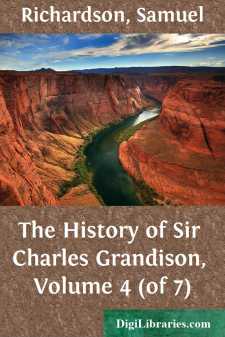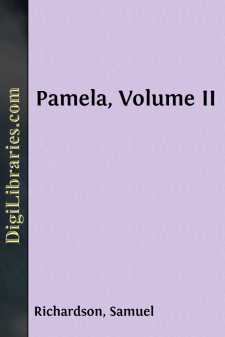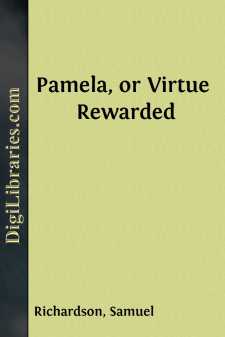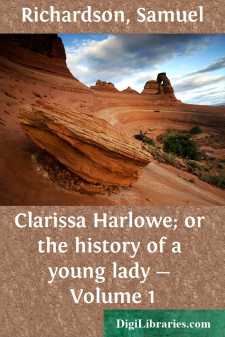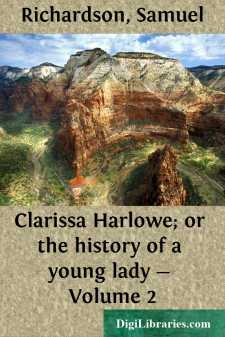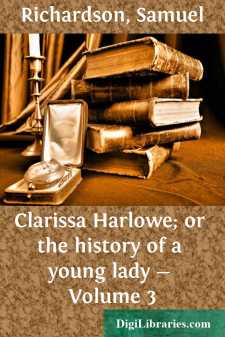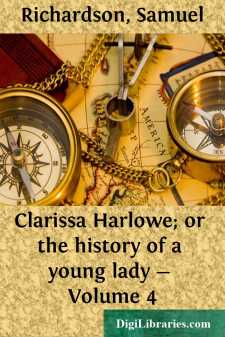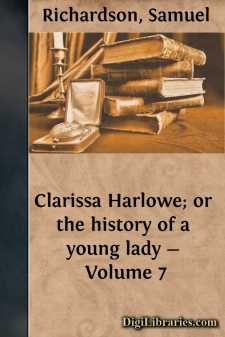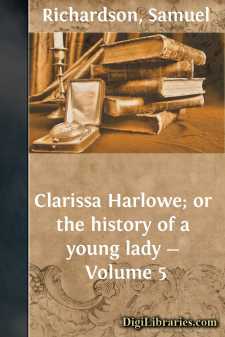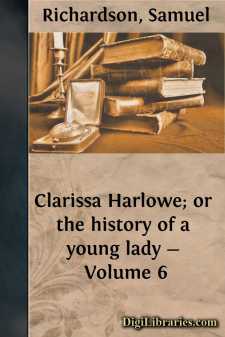Categories
- Antiques & Collectibles 13
- Architecture 36
- Art 48
- Bibles 22
- Biography & Autobiography 813
- Body, Mind & Spirit 141
- Business & Economics 28
- Children's Books 12
- Children's Fiction 9
- Computers 4
- Cooking 94
- Crafts & Hobbies 4
- Drama 346
- Education 46
- Family & Relationships 57
- Fiction 11826
- Games 19
- Gardening 17
- Health & Fitness 34
- History 1377
- House & Home 1
- Humor 147
- Juvenile Fiction 1873
- Juvenile Nonfiction 202
- Language Arts & Disciplines 88
- Law 16
- Literary Collections 686
- Literary Criticism 179
- Mathematics 13
- Medical 41
- Music 40
- Nature 179
- Non-Classifiable 1768
- Performing Arts 7
- Periodicals 1453
- Philosophy 64
- Photography 2
- Poetry 896
- Political Science 203
- Psychology 42
- Reference 154
- Religion 513
- Science 126
- Self-Help 83
- Social Science 81
- Sports & Recreation 34
- Study Aids 3
- Technology & Engineering 59
- Transportation 23
- Travel 463
- True Crime 29
Samuel Richardson
Samuel Richardson was an 18th-century English writer and printer, renowned for pioneering the epistolary novel format with his works "Pamela, or Virtue Rewarded" (1740) and "Clarissa, or The History of a Young Lady" (1748). His novels, characterized by their use of letters to develop characters and plot, played a crucial role in the development of the modern novel. Richardson's focus on the inner lives and moral struggles of his characters significantly influenced later writers and the literary landscape of his time.
Author's Books:
Sort by:
LETTER I MISS BYRON, TO MISS SELBY Miss Byron, To Miss Selby. O my Lucy! What think you!—But it is easy to guess what you must think.I will, without saying one word more, enclose DR. BARTLETT'S TENTH LETTER The next day (proceeds my patron) I went to make my visit to the family. I had nothing to reproach myself with; and therefore had no other concern upon me but what arose from the unhappiness...
more...
LETTER I My dear father and mother, We arrived here last night, highly pleased with our journey, and the occasion of it. May God bless you both with long life and health, to enjoy your sweet farm, and pretty dwelling, which is just what I wished it to be. And don't make your grateful hearts too uneasy in the possession of it, by your modest diffidence of your own unworthiness: for, at the same...
more...
LETTER IDEAR FATHER AND MOTHER,I have great trouble, and some comfort, to acquaint you with. The trouble is, that my good lady died of the illness I mentioned to you, and left us all much grieved for the loss of her; for she was a dear good lady, and kind to all us her servants. Much I feared, that as I was taken by her ladyship to wait upon her person, I should be quite destitute again, and forced to...
more...
The following History is given in a series of letters, written Principally in a double yet separate correspondence; Between two young ladies of virtue and honor, bearing an inviolable friendship for each other, and writing not merely for amusement, but upon the most interesting subjects; in which every private family, more or less, may find itself concerned; and, Between two gentlemen of free lives;...
more...
LETTERS OF VOLUME II LETTER I. Clarissa to Miss Howe.—Another visit from her aunt and sister. The latter spitefully insults her with the patterns. A tender scene between her aunt and her in Arabella's absence. She endeavours to account for the inflexibility of her parents and uncles. LETTER II. Miss Howe to Clarissa.—Humourous description of Mr. Hickman. Imagines, from what Lovelace, Hickman,...
more...
LETTERS OF VOLUME III LETTER I. Miss Howe to Clarissa.—Is astonished, confounded, aghast. Repeats her advice to marry Lovelace. LETTER II. Clarissa to Miss Howe.—Gives a particular account of her meeting Lovelace; of her vehement contention with him; and, at last, of her being terrified out of her predetermined resolution, and tricked away. Her grief and compunction of heart upon it. Lays all to...
more...
LETTER I MISS CLARISSA HARLOWE, TO MISS HOWE WEDNESDAY AFTERNOON, APRIL 26. At length, my dearest Miss Howe, I am in London, and in my new lodgings.They are neatly furnished, and the situation, for the town, is pleasant. But I think you must not ask me how I like the old gentlewoman. Yet she seems courteous and obliging.вÐâHer kinswomen just appeared to welcome me at my alighting. They...
more...
LETTER I MISS HOWE, TO MISS CLARISSA HARLOWE WED. NIGHT, JULY 12. I write, my dearest creature, I cannot but write, to express my concern on your dejection. Let me beseech you, my charming excellence, let me beseech you, not to give way to it. Comfort yourself, on the contrary, in the triumphs of a virtue unsullied; a will wholly faultless. Who could have withstood the trials you have...
more...
LETTER I MR. LOVELACE, TO JOHN BELFORD, ESQ. FRIDAY EVENING. Just returned from an airing with my charmer, complied with after great importunity. She was attended by the two nymphs. They both topt their parts; kept their eyes within bounds; made moral reflections now-and- then. O Jack! what devils are women, when all tests are got over, and we have completely ruined them! The coach carried us to...
more...
LETTER I MR. LOVELACE, TO JOHN BELFORD, ESQ. SAT. MIDNIGHT. No rest, says a text that I once heard preached upon, to the wicked—and I cannot close my eyes (yet only wanted to compound for half an hour in an elbow-chair)—so must scribble on. I parted with the Captain after another strong debate with him in relation to what is to be the fate of this lady. As the fellow has an excellent head, and...
more...


